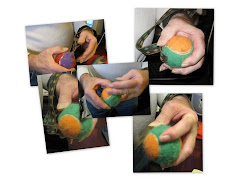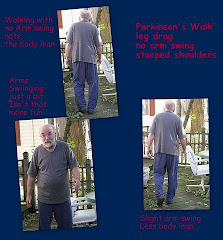When we speak of weight loss in Parkinson's patients, we're not
 talking about those extra 10 pounds we fret about every Spring. We're talking about 40 pounds of muscle and some body fat that many PWPs can ill afford to lose. Oh sure, midlife weight gain can also be an early warning sign of PD but usually it takes some time to put that weight on. And gradually shedding pounds can be a good thing for many of us while rapidly losing weight is a warning sign.
talking about those extra 10 pounds we fret about every Spring. We're talking about 40 pounds of muscle and some body fat that many PWPs can ill afford to lose. Oh sure, midlife weight gain can also be an early warning sign of PD but usually it takes some time to put that weight on. And gradually shedding pounds can be a good thing for many of us while rapidly losing weight is a warning sign.Most of the Parkinson's weight loss occurs in the late stages or is caused by PD medication side effects:
Anorexia
Constipation
Depression
Diarrhea
Dry Mouth
Fatigue
Heartburn
Loss of sense of taste-smell
Nausea/vomiting
Sleep disruption
Symptoms + side effects = unexplained weight loss
increased fatigue
orthostatic hypotension
bone thinning
nurtient depletion
PD issues in the kitchen and at the table
Symptomatically the disease impedes the entire eating process from delivery to elimination so eventually it will be time to make adjustments.
Movement: inability to hold utensils, to chew and/or swallow many foods. There are utensils to help you. There are adjustments to cooking methods. There are food processors, blenders, old fashioned grinders, mashers, straws and cookbooks.
Fruit: Eating fruit 1/2 hour before a meal may be a good practice but if you are fructose
 intolerant you can expect bloating, gas, cramps. Fruit can be a pleasant source of fiber as a constipation aid if you eat the skin or a fruit with edible seeds such as strawberries-a good antioxidant food source. For those who read about fruit fermenting when other carbs are added to the mix, that has been pretty much debunked but it won't hurt to do so if you can. Do drink fruit juices slowly so that your saliva can begin the digestion process.
intolerant you can expect bloating, gas, cramps. Fruit can be a pleasant source of fiber as a constipation aid if you eat the skin or a fruit with edible seeds such as strawberries-a good antioxidant food source. For those who read about fruit fermenting when other carbs are added to the mix, that has been pretty much debunked but it won't hurt to do so if you can. Do drink fruit juices slowly so that your saliva can begin the digestion process.Note: if you are diabetic you already know that fructose is not as easily absorbed as sucrose and glucose but should be combined with other foods...in moderation.
Alter the types and preparations of food. A PWP may find the adjustments easier to digest.
Veggies: unless soft, may be too difficult to deliver to mouth, to chew properly, to swallow, not to choke.
Protein redistribution - patterns of eating: Doing the protein packing for the evening
 meal so that the blocking of the levadopa won't interfer with daily activities presents a problem for a patient who wants to roll over in bed but can't because they are symptomatic; who wants to use the bathroom at night but can't move well enough to get there. Ok, protein packing at night worked on paper. The problem is that if you avoid protein altogether you can develop protein malnutrition. The optimum protein for a PWP on a 2,000 calorie regimen is about 47 grams or 7.56 tablespoons. According to Boston University research this should be about half the pre-PD intake although in actuality it appears to be significantly less. For example 1/2 of a Quarter Pounder is more than 2 days' protein...and that's without cheese of course.
meal so that the blocking of the levadopa won't interfer with daily activities presents a problem for a patient who wants to roll over in bed but can't because they are symptomatic; who wants to use the bathroom at night but can't move well enough to get there. Ok, protein packing at night worked on paper. The problem is that if you avoid protein altogether you can develop protein malnutrition. The optimum protein for a PWP on a 2,000 calorie regimen is about 47 grams or 7.56 tablespoons. According to Boston University research this should be about half the pre-PD intake although in actuality it appears to be significantly less. For example 1/2 of a Quarter Pounder is more than 2 days' protein...and that's without cheese of course.Another issue is dehydration. Some medications cause urine retention; PD symptoms often include frequent urination. In either case, discomfort or embarassment leads to insufficient fluid intake. This can also lead to loss of appetite. Again swallowing can be an issue and therapy is available as well as exercises one can do at home. Special cups can make swallowing easier but they should not be a substitute for exercise.
Swallowing liquids can be difficult - pudding/shakes/smoothies = easier. So have a milk shake or smoothie, it's thicker, easier to swallow, it is a good source of calcium and Vitamin D. Yes, it is. And also a good source of protein. Oops. When can you drink it? When you aren't on levadopa perhaps at the end of the day (but see: above)
Don't underestimate the need for a good dietician or nutritionist. Medical malnutrition can be a serious condition as PD progresses. Diet must constantly adjust and adapt to the changing meds and the needs of the body and the abilities of the patient.
Caused by dry mouth: a side effect of PD meds, Xerostomia can cause problems with speaking and eating. The lack of saliva means that the protection it offers in re-mineralizing the tooth enamel is lost. It not only makes the mouth more susceptible to infections but the tooth decay it causes is often untreatable. Since there are some treatments for dry mouth, it should not be neglected since tooth and jaw bone loss can result and leave a patient with no option but limited ability to chew on awkwardly fitting dentures as musculature changes.
references and resources:
Xerostomia information
http://www.oralcancerfoundation.org/dental/xerostomia.htm
http://www.oralcancerfoundation.org/dental/xerostomia.htm
Conversion tables for cooking














No comments:
Post a Comment
Welcome to Parkinsons Focus Today.
We are delighted to hear from you by comment here
or through email as found in Contact Us.
Please do not include email addresses if leaving a comment online.
Email addresses are used only for email responses.
Spammers take note: your messages will not be published. The comments section is for an exchange of ideas, not for backlinks.